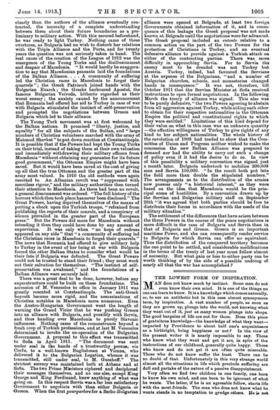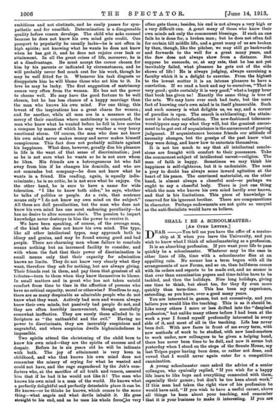THE LOWEST FORM OF INSPIRATION.
AN does not know much by instinct. Some men do not even know their own mind. It is one of the things no one can learn to know. It is a knowledge which comes naturally, or, to use an antithetic but in this case almost synonymous term, by inspiration. A vast number of people, as soon as they are grown up, plunge into the world, not knowing what they want out of it, just as many women plunge into shops. The good bargains of life are not for them. Does this piece of gratuitous knowledge—the knowledge of what they want— imparted by Providence to about half one's acquaintance as a birthright, bring happiness or not ? In the view of the present writer it is nearly impossible to say. Those who know what they want and get it are, in spite of the instructions of our childhood, generally quite happy. Those who know and do not get it are often quite miserable. Those who do not know suffer the least. There can be no doubt of that. Unfortunately in this very strange world almost all the situations in life which preclude suffering are dull and partake of the nature of a passive disappointment. Very often we find two children in one family, one born to know his own mind, and one born to be ignorant of what he wants. The latter, if he is an agreeable fellow, starts life with the most friends. The man who does not know what he wants stands in no temptation to grudge others. Ile is not
ambitious and not obstinate, and he easily passes for sym- pathetic and for unselfish. Determination is a disagreeable quality before reason develops. The child who asks counsel because he does not know his own mind gets credit. One passport to popularity he usually lacks—be is not often in high spirits; not knowing what he wants he does not know when he has got it, and he does not rejoice over luck or attainment. In all the great crises of life, moreover, he is at a disadvantage. He must accept the career chosen for him by his parents or indicated by circumstances, and be will probably never feel much zest for his work, though he may be well fitted for it. Whenever his task disgusts or disappoints him be will blame those who set him to it. In love he may be lucky. The first suggestion of matrimony comes very often from the woman. He has not the power to choose well. He may have the good fortune to be well chosen, but he has less chance of a happy marriage than the man who knows his own mind. For one thing, this lowest of the inspirations has a great charm for women ; and for another, while all men are in a measure at the mercy of their emotions where matrimony is concerned, the man who knew what he wanted before he fell in love carries a compass by means of which he may weather a very heavy emotional storm. Of course, the man who does not know his own mind never makes money and never makes himself conspicuous. This fact does not probably militate against his happiness. What does, however, greatly dim his pleasure in life is the want of that sense of discrimination; just as he is not sure what he wants so he is not sure whom he likes. His friends are a heterogeneous lot who fall away from him if he changes his domicile, and who are not comrades but company—he does not know what he wants in a friend. His reading, again, is equally indis- criminate; he is no critic, he is not sure what he enjoys. On the other hand, he is sure to have a name for wide toleration. "I like to know both sides," he says, whether he talks of politics or people. As a rule, that sentence means only " I do not know my own mind on the subject." All these are dull peculiarities, but the man who does not know his own mind has one most endearing peculiarity—be has no desire to alter someone else's. The passion to impart knowledge never destroys in him the power to receive it.
We have been speaking, of course, of the average man, of the kind who does not know his own mind. The type, like all other intellectual types, may approach both to idiocy and genius, and may be found among good and bad people. There are charming men whose failure to conclude means nothing but an increased facility to consider, and with whom the fact that their power of discrimination is small means only that their capacity for admiration knows no limits. They do not know very clearly what they want, therefore they ask for nothing, but are always giving. Their friends rest in them, and pay them that greatest of all tributes—turn to them when they know themselves to blame. In small matters and in great who has not taken untold comfort from time to time in the affection of persons who have no critical capacity, moral or otherwise ? Needless to say, there are as many despicable as admirable people who do not know what they want. Actively bad men and women always know their own minds, but passively bad people do not, and they are often horribly inconvenient, though mercifully somewhat ineffective. They are surely those alluded to in Scripture as " the unthankful and the evil." Having no power to discriminate, they are incurably suspicious and ungrateful, and where suspicion dwells highmindedness is impossible.
Two spirits attend the christening of the child born to know his own mind—they are the spirits of success and of despair. Before he is six years old he will he intimate with both. The joy of attainment is very keen in childhood, and who that knows his own mind does not remember the misery of crying for what he wanted and could not have, and the rage engendered by the Job's com- forters who, at the sacrifice of all truth and reason, assured him that if he had it he would not like it ! The man who knows his own mind is a man of the world. He knows what a perfectly delightful and perfectly detestable place it can be. He knows—or he thinks he knows, which comes to the same thing—what angels and what devils inhabit it. He goes straight to his end, and as he uses his whole force ,he very often gets there; besides, his end is not always a very high or a very difficult one. A great many of those who know their own minds ask only the commonest blessings. If such an one fails he is done for, a broken man; but he does not often fail for certain till middle life, and a great many of us are broken by then, though, like the pitcher, we may still go backwards and forwards to the well for a great many years, and the flaw does not always show from a distance. But suppose he succeeds, or, at any rate, that he has not yet inevitably failed, what pleasure he gets out of the side shows of life ! He is always judging, always exercising a faculty which it is a delight to exercise. From the highest to the lowest matter it is an intense pleasure to have a conviction. If we read a book and say to ourselves, "That is very good; quite certainly it is very good," what a happy hour that book has given us ! Exactly the same thing is true of the arts. We may have ever such bad taste, but the mere fact of knowing one's own mind is in itself pleasurable. Such and such scenery is what delights us, we say, and a corner of paradise is open. The search is exhilarating; the attain- ment is absolute satisfaction. The new-fashioned tolerance- worshippers may say what they will, but the greatest amuse- ment to be got out of acquaintance is the amusement of passing judgment. If acquaintances become friends om• attitude of necessity changes, but the gossips of the past knew what they were doing, and knew how to entertain themselves.
It is not too much to say that all intellectual conclu- sions are fraught with comfort to their possessors. Take the commonest subject of intellectual unrest—religion. The man of faith is happy. Sometimes we may think his happiness is self-righteous, but it is undeniable. The man a prey to doubt has always some inward agitation at the heart of his peace. The convinced materialist, on the other hand, is almost always a cheerful soul—or perhaps we ought to say a cheerful body. There is just one thing which the man who knows his own mind hardly ever knows, and that is his limitations. This piece of knowledge is reserved for his ignorant brother. There are compensations in character. Perhaps endowments are not quite so unequal as the anti-Socialists would have us believe.















































 Previous page
Previous page